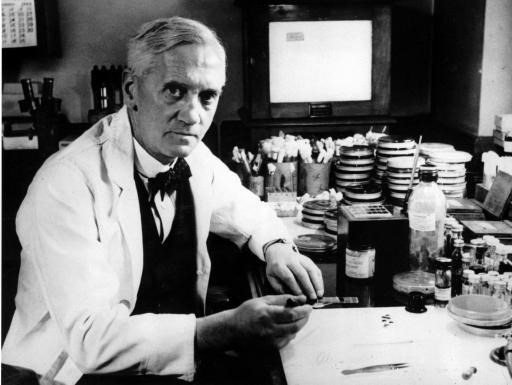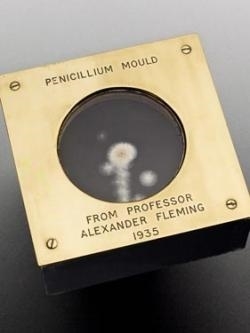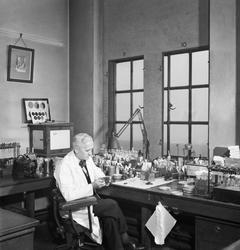 |
| (www.awesomestories.com ()) |
If only Fleming's critics knew what they were doubting, possibly one of the most important medical finds to date. No one thought what they brushed aside was Penicillin, the antibiotic that saved forces during World War II, and millions of lives."'One sometimes finds not what one is looking for'"(Wennergren, Goran. "Result Filters." National Center for Biotechnology Information). It would have been impossible to have guessed that Alexander Fleming's revolutionary invention of Penicillin was accidental. Had he thrown away the petri dish or cared less to examine it, millions of lives may have been lost, opposed to millions saved. Alexander Fleming was born to a farming family in Scotland on August 6th, 1881. He was the seventh of eight children, and lived with his two parents. However, Fleming's father passed away when he was seven, leaving his mother and the eldest stepson to get the farm work done. Fleming was a prize-winning medical student at St.Mary's Hospital. He began his work at a laboratory in London, and soon after, discovered Penicillin. In,1928 he found one of the first antibiotics in history. With this astounding find, Fleming's antibiotic was able to save many lives throughout World War II. Because of his heroic actions, Fleming was awarded the Nobel Peace Prize in 1945, and was knighted in 1944. A hero must be able to save others lives and challenge the norm. A hero is someone who truly makes a difference in someone's life, they push their boundaries and go out of their way in order to help others.A hero is a true inspiration when they challenge other people's views.Heroes do what their heart tells them to, and go to new limits, just to show anyone else can do the same. Alexander Fleming is a hero because he saved many soldiers lives while testing the customary belief at the same time. Fleming's invention was extremely beneficial during World War II, had penicillin not been invented, millions would not have survived. Fleming had worked tediously for years, putting together his research and writing about his findings. He went through a torturous amount of research, but was determined to continue his lab-work.
 |
| (zarkanzar.blogspot.com ()) |
"During World War II, the drug was rushed into mass-production in England and the United States and saved thousands of injured soldiers from infections that would otherwise have been fatal "("Alexander Fleming." World of Health.).Fleming's discovery was extremely helpful during World War II, it helped save soldiers lives and still continues to do so to this day. Soldiers that had infected wounds were extremely susceptible to a quick and painful death if not amputated. Penicillin prevented thousands of soldiers from dying, and when this was uncovered, Penicillin was in mass production. Penicillin was key for World War II in terms of keeping soldiers on the battlefield. Had it been discovered later, it would not have had the same impact on the world. Revitalizing troops quickly was key, and Penicillin did just that. It would take hours before a doctor was able to see some soldiers, and many of the open wounds would get infected. However, Penicillin prevented major infection in soldiers, which was the reason many were able to get their feet back on the battlefield. Fleming stumbled upon Penicillin by accident, nonetheless it was an important find. He knew how to put the wonder antibiotic to use, as he had been experimenting with mold. Once he looked into the petri dish and saw "...one of his culture plates contaminated by a mold called Penicillium notatum. Around the mold, there was a ring in which no bacteria grew"( "Alexander Fleming, Sir." Science and Its Times.), at that point, Fleming could see he had a breakthrough. Alexander Fleming discovered penicillin, a "wonder drug" that ushered in the era of antibiotics.. "This new weapon against bacterial disease offered hope in fighting many infections that could not be treated effectively in the past"( "Alexander Fleming, Sir." Science and Its Times.) Alexander Fleming's discovery not only helped on the battlefield, it was extremely helpful in the late 19th-Century for hospitals and home use, as it still is today. It has saved an estimated 200 million lives, and only continues to do so.Others and Fleming himself blew off what he found as a mere enzyme. However, he knew there was something more to it. So he dug deeper, and with enough passion and will, he challenged the norm, and found the antibiotic that would change his life, and others, forever. Penicillin turned many away from the doors of death during World War II, and it still did even afterwards. Penicillin was a revolution, it ushered in the era of antibiotics, and it gave millions hope, more specifically, it gave 200 million people hope. Penicillin was one the first antibiotics in history, and it made minor injuries a less dangerous road to death, which is why it is considered so important.
Fleming had to battle others perspectives throughout his career, Fleming did not look at his work with the usual eye. He took risky steps to go beyond boundaries others set, and that key to why he was successful. If Fleming had followed procedure, he would never had found success. But thankfully, he had an impressive mindset for science. Fleming was always looking for ways to challenge others, because he knew he had to be a strong soul in order for him to do his research: "With the experienced eye of a scientist, Alexander Fleming turned what appeared to be a spoiled experiment into the discovery of the first of the 'wonder drugs',Penicillin'("Alexander Fleming." World of Health.). Fleming took what many would discard, a soiled experiment, and looked deeper into it. He did not look at some things the way others did, because he knew how science worked. It could only take someone with the like mind of Alexander Fleming to take a completely different view on something, like a ruined experiment, and know something lied within it. Others and Fleming himself blew off what he found as a mere enzyme. However, he knew there was something more to it. So he searched profoundly, and with enough passion and will, he challenged others opinions, and found the antibiotic that would change his life, and others, forever. For a scientist to constantly challenge the world's opinions is very difficult, despite that it was all Fleming did. He always found it enticing to be able to expand his mind and try things no one else had done, no matter how many times it was called malarkey. "'There are of course, many rules to this play...but when you have acquired knowledge and experience it is very pleasant to break the rules and to be able to find something nobody had thought of'"(The Mold in Dr.Florey's Coat pg.12"). Fleming was always searching to find something, even before his discovery. His knowledge allowed him to break through the mold of being just a scientist, and wanted to help others. He never listened to others, he followed his heart, and did what he knew was right. Fleming accomplished his amazing discovery by his hard work and dedication. Although his lab-mates wanted to throw away the plate, he put his best work in so he would find something no one else could see, he saw things with the mind of a genius. Fleming took a lot of criticism for his work, however he knew at the end of the tunnel there was a light. He always dug deeper into his experiments, his mindset was to always keep pushing boundaries. No matter how tough they were, Fleming always worked hard to break the rules and succeed.
 |
| (www.iwm.org.uk ()) |
Fleming accomplished what he did through his perseverance, he saved lives because he worked hard, and he challenged the norm because it was key to being a scientist, Fleming started very small, his change from a farmer boy to a world-changing scientist was not easy. Yet it was the dedication to his passion that lead him to his destiny. He certainly did not plan to stumble upon Penicillin, however he knew his work in the small laboratory was good for something. Allied Forces were saved because of Penicillin, but it took years of Fleming challenging others opinions of his work in order to win his Nobel Peace Prize in 1945. Fleming had a lot of criticism, luckily he kept his head high and just followed his heart. Fleming was not one to care about fame or fortune, what he cared about was the actual science. While other scientists thrived to do things systematically so they would get the desired outcome,Fleming was always looking for something, and he did not stop short to listen to others. Fleming cared about what he would do next, and soon enough, he found what he looked for.This is why Fleming is an inspiration to me, because he took a lot of criticism and yet, never gave up. He knew following your heart truly will lead you to your dreams. Fleming started as a small farmer boy, but ended up being knighted in 1944 by King George VI. The world is always changing, in good ways and bad. There are few out there that will help others, because they have a heart of gold. In today's society they are heroes, and in tomorrow's they are heroes. Alexander Fleming was one of them, his legacy lives on in lives that are being saved today, and the ones that were being saved decades ago. Fleming was a revolution, it is estimated penicillin has saved 200 million lives, and it continues to do so. Fleming is an example that, those who set their mind to something, will find it. Hard work will lead you to your destiny, this is the lesson Fleming displayed most.
Works Cited
"Alexander Fleming." World of Health. Gale, 2006. Biography in Context. Web. 8 May 2015
Alexander Fleming, Sir." Science and Its Times. Ed. Neil Schlager and Josh Lauer. Vol. 6. Detroit: Gale, 2000. Biography in Context. Web. 8 May 2015.
Wennergren, Goran. "Result Filters." National Center for Biotechnology Information. U.S. National Library of Medicine, Jan. 2007. Web. 14 May 2015.
Lax, Eric. The Mold in Dr. Florey's Coat: The Story of the Penicillin Miracle. New York: H. Holt, 2004. Print.
"Alexander Fleming, Sir." Science and Its Times. Ed. Neil Schlager and Josh Lauer. Vol. 6. Detroit: Gale, 2000. Biography in Context. Web. 8 May 2015.
Page created on 5/21/2015 12:00:00 AM
Last edited 5/21/2015 12:00:00 AM
